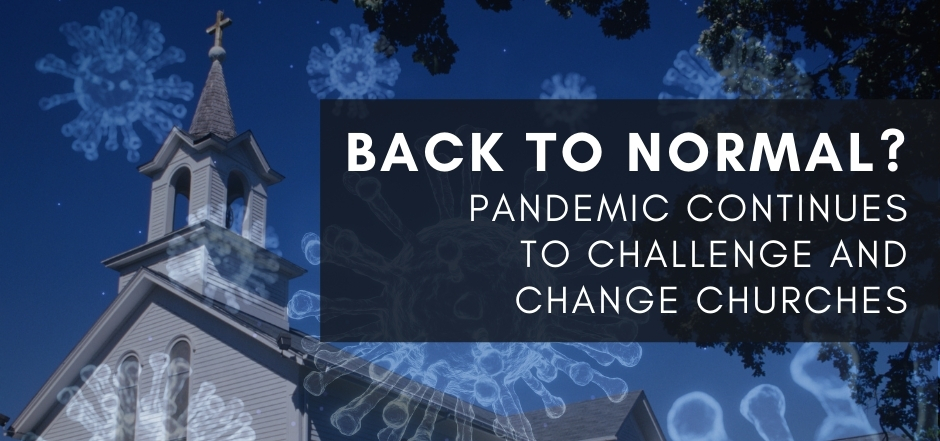Hopes were high as churches in the Diocese of Central Florida prepared to celebrate Pentecost Sunday on May 23. The vaccines were working, and the number of COVID-19 cases continued to decline. The CDC relaxed restrictions for fully vaccinated people, and the diocese was cautiously optimistic with new COVID guidelines.
The Rev. Stuart Shelby, rector of All Saints Episcopal Church in Winter Park, captured the hopefulness many were experiencing. “I am grateful as I think about Pentecost Sunday, 2021,” Shelby said. “To have things opening up, just taking one more step, it’s really encouraging. And Bishop Brewer’s leadership and everybody coming together in our diocese has made sure that we have some relevance and connection that I know many of our colleagues in other dioceses have lost.”
However, by July, new COVID-19 cases in Florida were on the rise due to the more contagious Delta variant and decreasing vaccination numbers. The Rt. Rev. Gregory Brewer, bishop of the Diocese of Central Florida, again urged caution and provided guidance in a July 16 letter to diocesan clergy.
“I would ask that you think carefully about the trust and responsibility that is commended to us,” Brewer wrote. “Please encourage people who have not been vaccinated to reconsider their decision. Please review and follow diocesan guidelines and, at minimum, remain masked anytime you may be in contact with persons who may not have been vaccinated.”
With the pandemic continuing to challenge churches in the diocese, what can we glean from the clergy and congregations who have been weathering the shifting COVID storm? Instead of returning to normal, how have our churches changed?
Growing Through Change
“For our church, the pandemic changed things for the better,” The Rev. Lisa Wimmer, rector of St. Mary’s Episcopal Church in Belleview, Florida, affirmed. “We realized how important it is to stay connected.”
Wimmer and other priests faced a myriad of challenges along with surprising joys. Some of the biggest challenges involved technology, Wimmer said. She tried numerous programs before she settled on appropriate ways to continue to minister when in-person ministry was no longer an option.
She had to replace the church bookkeeper and the secretary as they moved on to other opportunities. Today, some families still don’t feel safe coming back to church, especially if they have a susceptible family member at home.
The challenges forced Wimmer to innovate. The church purchased a radio transmitter and hosted a drive-in service, enabling people to listen on their car radios. The host, pre-intincted with wine, was passed out to participants in zip-lock bags that also contained pictorial bookmarks with reminders of the day’s lesson. Live online services became a regular worship option and remain popular today with those unable to attend in person.
But Wimmer stressed the importance of asking for help. “Get a team of people together and work with them,” she said. Six people assisted her in every service, and each member of the vestry called 20 people every week to check on them and respond to needs.
The pandemic has not stopped the blessings from rolling in at St. Mary’s. People have stayed connected. New members joined the congregation. A third service was added recently to reach young families. Last-minute checks came in the nick of time to meet obligations. In addition, the church’s Paycheck Protection Program loan was forgiven. People came back to church with a new joy and thankfulness.
On Pentecost Sunday, four people were baptized. When the bishop visited on June 6, one more baptism took place, three people reaffirmed their faith, and one person was confirmed. The church also received seven new members.
“I was encouraged that so many came forward desiring to enter into a closer relationship with Christ, especially since we did not have much more than a month to announce that the bishop would be visiting and that confirmation, reception and reaffirmation would be available,” Wimmer said.
Reestablishing Habits for an Uncertain Future
Many diocesan churches have also had to endure the grief of losing loved ones to the pandemic. “It felt bizarre and surreal around the church campus,” said The Rev. David Peoples, rector of St. Stephen’s in Lakeland. Eighteen people from his church died in one year (six of COVID), including the church administrator, Peoples said. He had never witnessed anything like it.
The lockdown led to broken habits, and attendance remains down slightly, he said. With the various adaptations as well as five children at home, he had little down room for respite. “Looking out for myself was not a high priority at the time,” he admitted.
But St. Stephen’s also saw pandemic-related gains. The church expanded its online presence to multiple videos a day, including morning prayer and readings from The Chronicles of Narnia. Peoples said his church reached many more people virtually than they would ever have been able to minister to in person.
“God is faithful in all circumstances and will lead us through,” Peoples affirmed. Rather than try to prognosticate about ways the future will be different, he stressed the importance of reestablishing habits that will help us prepare for whatever the future may hold.
“I worked harder and longer, but people know I care now, more than ever,” Wimmer said as she reflected on the pandemic. “God is doing a new thing.”

